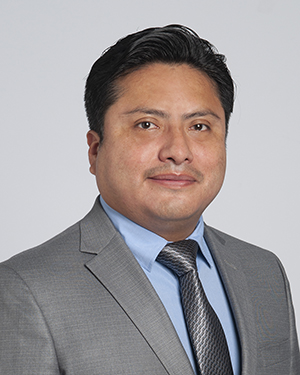Rodrigo Lopez Gonzalez Laboratory
-
Rodrigo Lopez Gonzalez Laboratory
- Principal Investigator
- Research
- Our Team
- Publications

Rodrigo Lopez Gonzalez, PhD
Assistant Staff
Email: [email protected]
Location: Cleveland Clinic Main Campus
Research
Our lab investigates the molecular and cellular mechanisms underlying amyotrophic lateral sclerosis (ALS) and frontotemporal dementia (FTD), with emphasis on the C9orf72 repeat expansion—the most common genetic cause of these disorders. Using patient-derived stem cells, brain organoids, and in vivo models, we aim to uncover how genome instability and aging drive neurodegeneration and identify actionable therapeutic targets.
Biography
Rodrigo Lopez Gonzalez, PhD, is an Assistant Staff scientist in the Department of Neurosciences at the Cleveland Clinic Lerner Research Institute and an Assistant Professor at the Cleveland Clinic Lerner College of Medicine of Case Western Reserve University.
Dr. Lopez Gonzalez earned his BS in Biology (2004), MS in Biochemistry (2008), and PhD in Biochemistry (2012) from the National Autonomous University of Mexico (UNAM). He completed postdoctoral training in the Department of Neurology at the University of Massachusetts Medical School (2012–2018), where he began investigating the molecular mechanisms of amyotrophic lateral sclerosis (ALS) and frontotemporal dementia (FTD).
His research combines patient-derived induced pluripotent stem cells (iPSCs), brain organoids, and in vivo models to uncover how genetic and cellular stressors drive neurodegeneration. His work has identified key pathogenic mechanisms, including nucleocytoplasmic transport defects, RNA splicing dysregulation, oxidative stress, DNA damage, and telomere attrition.
At Cleveland Clinic, Dr. Lopez Gonzalez leads a multidisciplinary program focused on understanding genome instability and cell-cycle re-entry as central pathways in neurodegeneration, with the goal of developing mechanism-based therapeutic strategies for ALS, FTD, and related disorders.
Education & Professional Highlights
-
Assistant Staff, Department of Neurosciences, Cleveland Clinic Lerner Research Institute (2020–present)
-
Assistant Professor, Cleveland Clinic Lerner College of Medicine, CWRU (2020–present)
-
Instructor, Neurology, UMass Medical School (2018–2020)
-
Postdoctoral Fellow, Neurology, UMass Medical School (2012–2018)
-
PhD, Biochemistry, National Autonomous University of Mexico (UNAM), 2012
-
MS, Biochemistry, UNAM, 2008
-
BS, Biology, UNAM, 2004
Selected Honors
-
Alzheimer’s Association Research Fellowship to Promote Diversity, PI, 2018–2021
Research
Research
Our lab investigates the molecular and cellular mechanisms driving amyotrophic lateral sclerosis (ALS) and frontotemporal dementia (FTD), with a particular focus on the C9orf72 repeat expansion—the most common genetic cause of these neurodegenerative diseases. Using patient-derived induced pluripotent stem cells (iPSCs), glia, and brain organoids, as well as in vivo systems, we study how genetic mutations disrupt neuronal function and genome stability.
We have uncovered key disease pathways involving nuclear–cytoplasmic transport defects, RNA splicing abnormalities, oxidative stress, DNA damage, telomere attrition, and the toxic effects of arginine-rich dipeptide repeats such as poly(GR) (Lopez-Gonzalez et al., Neuron 2016; Front Cell Dev Biol 2022). Our recent work demonstrated that p53 knockdown can rescue neuronal survival, identifying genome instability and aberrant cell-cycle re-entry as central drivers of C9orf72-related neurodegeneration (Lopez-Gonzalez et al., PNAS 2019; Maor-Noff et al., Cell 2021).
Building on these findings, our current research aims to model how aging and genome instability converge to promote neuronal vulnerability, using advanced iPSC-derived systems and integrated multi-omic approaches. Through these efforts, we seek to identify actionable pathways that can guide the development of targeted therapies for ALS, FTD, and related disorders.
Our Team
Selected Publications
-
Canete P, Do D, Lie R, Woodruff G, Lopez-Gonzalez R, Poplawski G. (2025). Development of high-content screening assay for gene silencing in adult sensory neurons. J Neurosci Methods 422:110500.
-
Limone F, Couto A, Wang J-Y, Zhang Y, McCourt B, Huang C, Minkin A, Marghi M, McNeer S, Keaney J, Gillet G, Lopez-Gonzalez R, Goodman WA, Kadiu I, Eggan K, Burberry A. (2024). C9orf72 functions in myeloid and lymphoid lineages to regulate the IL-17 inflammatory axis. Sci Transl Med 16:eadg7895.
-
Chi B, Öztürk MM, Paraggio CL, Leonard CE, Sanita ME, Dastpak M, O'Connell J, Coady JA, Zhang J, Gygi SP, Lopez-Gonzalez R, Yin S, Reed R. (2023). Causal ALS genes impact the MHC class II antigen presentation pathway. PNAS 120:e2305756120.
- Robinson H, Diaz Hernandez ME, Lopez-Gonzalez R. (2022). Telomere attrition in iPSC-derived neurons from C9ORF72 repeat expansion carriers. Front Cell Dev Biol 10:874323.
-
Lin YN, Kumar MS, Ramesh N, Anderson EN, Nguyen AT, Kim B, Cheung S, McDonough JA, Skarnes WC, Lopez-Gonzalez R, Landers JE, Fawzi NL, Mackenzie I, Lee EB, Nickerson JA, Grunwald D, Pandey UB, Bosco DA. (2021). Interactions between ALS-linked FUS and nucleoporins are associated with defects in nucleocytoplasmic transport. Nat Neurosci 24(8):1077–1088.
-
Maor-Noff M, Shipony Z, Lopez-Gonzalez R, et al. (2021). P53 is a central regulator driving neurodegeneration caused by C9orf72 poly(PR). Cell.
Preprints
-
Ali SK, Lian L, Robinson H, Daniels N, Prieto A, Poplawski G, Lopez-Gonzalez R. (2025). Cell cycle dysregulation contributes to neurodegeneration in human neurons from ALS/FTD-related C9orf72 repeat expansion carriers. bioRxiv 2025.06.04.657714.
Earlier Publications (selected)
-
Choi SY, Lopez-Gonzalez R, et al. (2019). Poly(GR) binds ATP5α and compromises mitochondrial function in vivo. Nat Neurosci 22:851–862.
-
Lopez-Gonzalez R, Yang D, et al. (2019). Ku80-dependent DNA repair pathway and neurodegeneration rescue in C9ORF72-ALS/FTD. PNAS 116:9628–9633.
-
Lopez-Gonzalez R, Lu Y, et al. (2016). Poly(GR) compromises mitochondria in iPSC-derived motor neurons. Neuron 92:383–391.
-
Freibaum BD, Lu Y, Lopez-Gonzalez R, Taylor JP. (2015). C9ORF72 compromises nucleocytoplasmic transport. Nature 525:129–133.